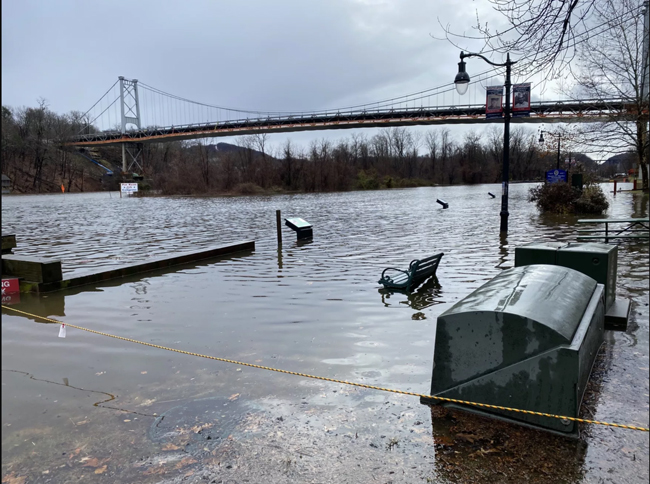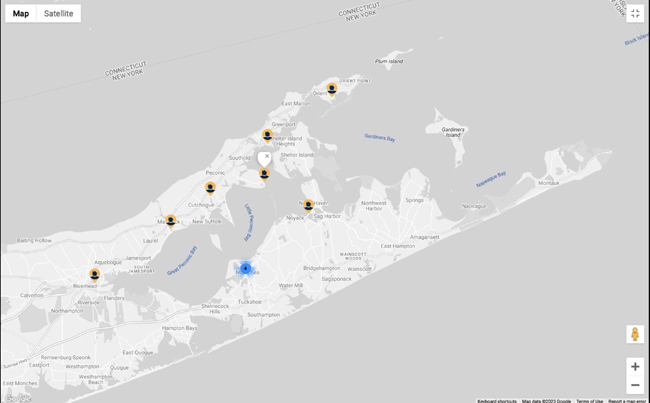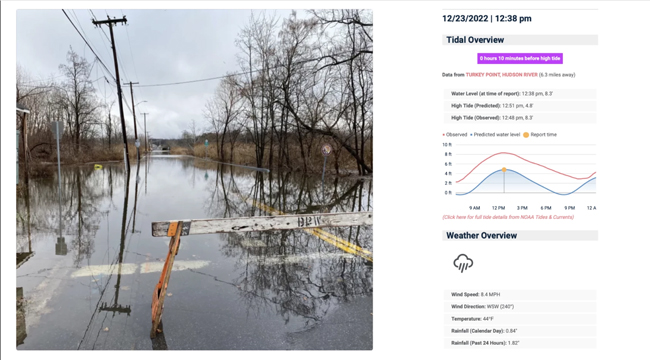
Emily Vail posted this photo from Kingston in Ulster County, New York during the Dec. 23 storm surge. Credit: Emily Vail / MyCoastNY
— By Molly Ingram for WSHU
If you don't see the player above, it's because you're using a
non-Flash device (eg, iPhone or iPad). You can download the mp3 file by clicking here (mp3). It may take a few minutes to download, so please be patient.
Stony Brook, NY, April 17, 2023 - Ten years ago, flooding from Superstorm Sandy caused massive damage along the coast, and forced coastal communities to spend millions on infrastructure upgrades. But when it comes to planning for the future, municipalities do not always know where roads and homes need to be reinforced for coming storms.
That’s where the app MyCoast comes in. It allows users to track and report environmental issues in their area.
“So a big storm event would happen. People would go out afterward, or sometimes during, to record 'okay, this is what's happening,'” MyCoast developer Wesley Shaw said.
Shaw developed MyCoast with his business partner Chris Rae in response to coastal flooding in Massachusetts.
“We're seeing erosion, we’re seeing houses falling down, we're seeing ports ripped off or whatever else like that,” Shaw said. “That would go, depending on the severity of the storm, either back to the office of coastal management or to the Emergency Operations Center to be processed. And that would help allocate resources after a storm.”
The MyCoast app is already used in eight states and the Virgin Islands — and not just for flooding. Washington tracks creosote-treated wood, and South Carolina tracks abandoned boats. New York Sea grant specialists Jessica Kuonen and Kathleen Fallon believe it could be the key to helping New York plan ahead for coastal events.
“We're seeing a lot of flooded parking lots and flooded streets with lots of homes in the background,” Kuonen said. “Marina parking lots, a lot of waterfront parks.”

Reports from Suffolk County. Credit: MyCoastNY
Kuonen said the goal of launching MyCoast in New York is to keep the public, as well as legislators, aware of the impacts of climate change on the region.
“The more reports we get, the more we can encourage our decision-makers at the county and municipal level,” Kuonen said. “You know, emergency managers, if they're using it in a risk communication, we would consider that a success”
More than 300 people have registered for the app since it launched in July of 2022.
Emily Vail uses the app in Kingston, which borders the Hudson River. She said tracking the flooding in her community makes her feel like she's contributing to finding a solution.
“It's not just me going out and documenting some pictures and wondering what I should do with them,” Vail said. “It's being compiled, it's being used in a way that is accessible to decision-makers, so that they can see. You know, municipal staff are really hard-working, they have so much on their plate, and they can't be everywhere at once. And so community members can help document some of these conditions.”
Vail used the app on Dec. 23 of last year, during the highest storm surge since Superstorm Sandy. She was able to pass information from the app on to first responders on the scene of the floods.
“The people who are on the ground who are dealing with emergency preparedness don't always have the latest information,” Vail said. “And so I was able to pull the app up right in real time and show the fire department, you know, here's what we're expecting. We can see visually what it looks like now. And here's what the current and then future tide phases will look like.”

One of the photos and reports uploaded by Emily Vail during the December 23rd storm surge. Vail uploaded the photo and the time it was taken, and MyCoast automatically attached data about the conditions. Credit: Emily Vail / MyCoastNY
Kuonen said the information compiled on Dec. 23 was passed on to the National Weather Service.
“They were really interested in the data from that event,” Kuonen said. “And I think it's helping them understand what waterfronts are vulnerable to storm surge.”
Kuonen and Fallon hope to finish their initial data analysis this summer. It’s a ton of information to consider, which can take time and expertise to wade through. Then, they’ll talk to users about how to improve the site, and ultimately decide if it's worth continuing.
More Info: New York Sea Grant
New York Sea Grant (NYSG), a cooperative program of Cornell University
and the State University of New York (SUNY), is one of 34 university-based
programs under the National Oceanic and Atmospheric Administration’s
National Sea Grant College Program.
Since 1971, NYSG has represented a statewide network of integrated
research, education and extension services promoting coastal community
economic vitality, environmental sustainability and citizen awareness
and understanding about the State’s marine and Great Lakes resources.
Through NYSG’s efforts, the combined talents of university scientists
and extension specialists help develop and transfer science-based
information to many coastal user groups—businesses and industries,
federal, state and local government decision-makers and agency managers,
educators, the media and the interested public.
The program maintains Great Lakes offices at Cornell University, SUNY
Buffalo, SUNY Oswego and the Wayne County Cooperative Extension office
in Newark. In the State's marine waters, NYSG has offices at Stony Brook
University in Long Island, Brooklyn College and Cornell Cooperative
Extension in NYC and Kingston in the Hudson Valley.
For updates on Sea Grant activities: www.nyseagrant.org has RSS, Facebook, Twitter, Instagram, and YouTube links. NYSG offers a free e-list sign up via www.nyseagrant.org/nycoastlines for its flagship publication, NY Coastlines/Currents, which is published quarterly.